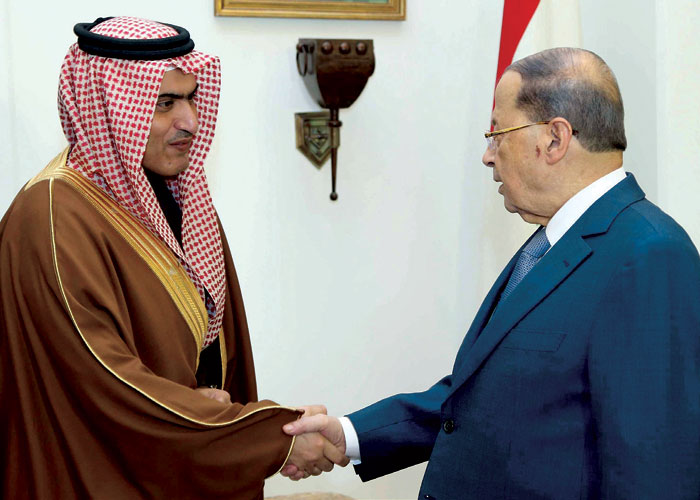Saudi-Lebanese ties warm up under watchful eye of Iran
Dalal Saoud/The Arab Weekly/February 13/17
Beirut – Saudi Arabia has taken another step to warm ties with Lebanon in what seems to be a careful process to reengage in the tiny country while awaiting — like its main regional rival, Iran — a final settlement in neighbouring war-ravaged Syria that would determine each one’s position and level of influence.
Saudi Arabia has appointed a new ambassador — a post vacant since last summer — and will allow the return of Saudi tourists and increased flights to Lebanon by its national carrier, Saudi Airlines
The announcement, made by Saudi Minister of State for Gulf Affairs Thamer al-Sabhan during a February 6th visit to Beirut, revived hopes for Lebanon’s ailing economy and for an easing of tensions between Saudi Arabia and Iran.
The Saudi move came among recently increased conciliatory statements by Iranian officials, who expressed readiness to improve ties, cooperate to solve political and sectarian disputes and restore security to the troubled region — all on condition that Riyadh changes its behaviour. There were, however, no indications that Tehran was changing its own behaviour on the ground.
By allowing its tourists back into Lebanon, Saudi Arabia is probably confident that there is no imminent danger facing them there. Hezbollah, the influential Shia militant group in Lebanon, has eased its harsh rhetoric against the Sunni monarchy and blessed the recent trip to Riyadh by its main ally, Lebanese President Michel Aoun.
Aoun tried to repair bilateral ties and pave the way for the return of much-needed Gulf investments, to Lebanon, a move Hezbollah said it would not object to because it has felt the effects of deteriorating economic conditions in Lebanon. After all, the economic ruin of Lebanon will not spare its own people and popularity.
Lebanon has historically enjoyed special attention from Saudi Arabia and its Gulf partners. It greatly benefited from their financial assistance, investments, tourism and trade as well as the considerable remittances, estimated at $7 billion to $8 billion a year, by 750,000 Lebanese nationals living and working in the Gulf states. Losing that would be a catastrophe for Lebanon, which suffered after being abandoned by its Saudi and Gulf supporters for almost a year.
However, that does not mean that the Iran-Saudi struggle over Lebanon’s influence is over.
“I don’t think it is time for Iran now to fight some Saudi tourism (in Lebanon),” said Riad Tabbarah, a former Lebanese ambassador to the United States, “but if (such Saudi re-engagement increases), there will be a point where Iran will put some resistance. I don’t think we are at this level yet.”
However, Iran’s tensions with the United States have been increasing lately due to its test-launching of ballistic missiles and US President Donald Trump’s tough and unpredictable approach.
“I think the pressure that Trump is putting and is going to put (on Tehran) will probably make an entente with Saudi Arabia more beneficial for Iran,” Tabbarah said.
While there were attempts at reconciliation with the Saudis before Trump assumed office, such moves are probably more urgent now. The Saudis, who stood firm against any rapprochement with Iran before it stopped interfering in Arab countries and threatening their security, feel more at ease and possibly in a stronger position with Trump’s policy shift towards Iran. Even Trump’s travel ban, now being litigated in US courts, did not provoke any strong Gulf reaction as it targeted Iran and six other Muslim-majority countries.
A major concession by Iran in Yemen, where it is aligned with the Houthi rebels in their fight against government-backed forces, would probably open “a window of opportunity for an entente”, Tabbarah said, and lead the Saudis to realise Iran is heading in the right direction and “therefore may be think it is not bad to have a rapprochement”.
However, the two regional rivals seem stuck in a waiting room. With a fast changing scene and new balance of power in Syria, the Trump- Iran escalation and the uncertainty regarding Russia-US relations, the parties are trying to consolidate their positions before major settlements arrive.
Hezbollah has already been affected by Trump’s pressures and fresh sanctions on Iran and will be even more so if the US administration moves ahead with designating Iran’s Islamic Revolutionary Guards Corps (IRGC) a terrorist organisation.
That has raised fears in Lebanon of renewed Hezbollah intransigence, this time concerning a new electoral law that could postpone upcoming general elections or, worse, plunge the country into a parliamentary vacuum.
Ghazi Youssef, a parliamentarian from Lebanese Prime Minister Saad Hariri’s Future bloc, said he saw “no interest” for Hezbollah to provoke an escalation in the country “for all the parties are escalating” in what seems to be a prelude for the upcoming settlements.
However, how a settlement in Syria would affect Hezbollah and Lebanon remains the big question.
While it is very difficult to predict the end game in Syria, Tabbarah concluded: “The future of Hezbollah depends on how much influence Iran will have in the final solution.”
**Dalal Saoud is the Deputy Editor-in-Chief of The Arab Weekly. She is based in Beirut.




















